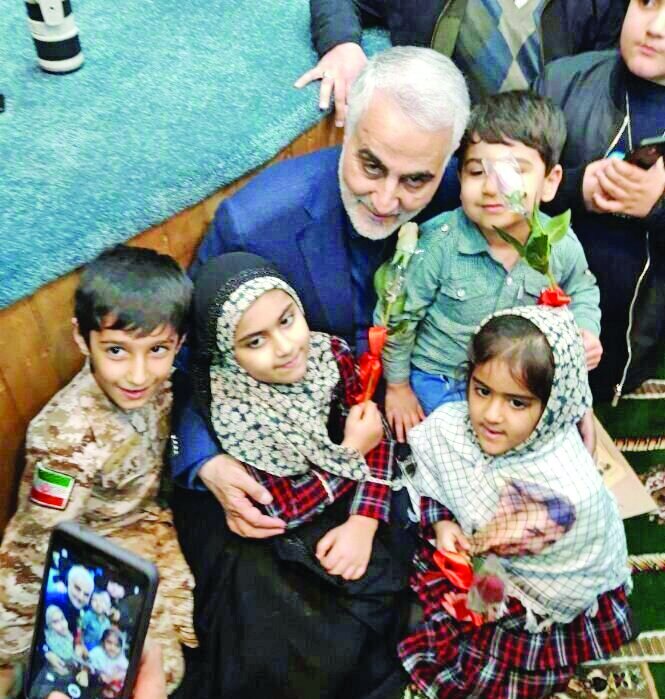Professor says General Soleimani’s legacy will be determined by his leadership in fighting ISIS

TEHRAN - Professor Arshin Adib-Moghaddam, chair of the Centre for Iranian Studies at the London Middle East Institute, commends Lieutenant General Qassem Soleimani’s leadership in the war against terrorists, especially ISIS, in Iraq and Syria.
“I am on the record for saying that General Soleimani’s legacy will be primarily determined by his leadership in the fight against ISIS,” Adib-Moghaddam tells the Tehran Times.
Nader Entessar, a professor emeritus of political science from the University of South Alabama, says General Soleimani’s acumen in fighting terrorists was “unmatched”.
In a commentary on January 8, five days after his assassination in a U.S. drone strike near Baghdad’s international airport, the TIME magazine wrote a commentary headlined “Soleimani spun a web of Iranian influence that will long outlive him”.
“Terrorism committed by a self-declared Muslim, Sikh or African is always represented as worse, than that committed by a white person. In the former case it’s said to be Islamist terrorism, in the case of the latter it’s represented as something out of the ordinary or the act of a mentally disturbed individual.” “He possessed a unique set of skills and relationships that were critical to Iran’s many successes over the past two decades. He was highly intelligent, decisive, and pragmatic. Those who worked with him all noted his soft-spoken demeanor, his coolness under pressure, his quiet authority, and his ability to know how to make people offers they could not refuse or did not want to.” the TIME said.
However, Professor Adib-Moghaddam criticizes the way Iran’s war against terrorism is being portrayed, saying, “Whenever Iran does something it is portrayed as particularly obstructive, aggressive, even hegemonic.” He says successive governments in Iran have failed “to battle this distorted image”.
‘Iran has been a victim of terrorism for decades’
On the role and position of Iran in the fight against terrorism, the professor says, “Undoubtedly, Iran has been a victim of terrorism for decades, both before and after the revolution.”
Just on November 27, Iranian nuclear scientist Mohsen Fakhrizadeh was assassinated outside Tehran. It was the latest in a series of terror acts against Iranian experts.
On June 7, 2017, Iran’s Parliament and the mausoleum of Imam Khomeini, founder of the Islamic Revolution, were targeted by two simultaneous gun and suicide bomb assaults. ISIS, known in its Arabic acronym as Daesh, claimed responsibility for the coordinated attacks.
In 1972, a special committee on terrorism was set up at the United Nations and member states made great efforts to provide appropriate definitions of international terrorism, but due to intense political differences, the actual definition of international terrorism and comprehensive conventions in practice was impossible. Security Council Resolution 1373 was the most serious attempt to define terrorism after the 9/11 attacks, which evolved into UN Security Council Resolution 1535. Despite providing a definition of terrorism, countries approach it differently.
Adib-Moghaddam, also an expert in global thought and comparative philosophies, says, “In the way the current international system is structured and policed even a vile, irrational and counterproductive strategy such as terrorism is always relative to the power of representation. By that I mean, that the truism that one man’s terrorist is another man’s freedom fighter is real not because it is right but because contemporary politicians and the mainstream media have habituated us into a tyrannical and barbarian political relativism that bullies us into betraying our morale and human principles, our rationality which differentiates clearly between right and wrong, if only this system would let us.”
The professor says an intentional killing of a civilian is terrorism whether it is done by a country or by an individual.
“The deliberate and direct killing of a civilian is clearly an act of terrorism from my perspective. In that case, it doesn’t really matter to my mind if the perpetrator is a state or a non-state actor,” Adib-Moghaddam says.
However, the leading academic says an act of terror by a Muslim or a non-white person is highly publicized in comparison.
“Yet, terrorism committed by a self-declared Muslim, Sikh or African is always represented as worse, than that committed by a white person. In the former case it’s said to be Islamist terrorism, in the case of the latter it’s represented as something out of the ordinary or the act of a mentally disturbed individual. This is why for decades now, police forces in Europe and North America totally underestimated the terror from the global right-wing until it killed people en masse,” says chair of the Centre for Iranian Studies at the London Middle East Institute.
The professor goes on to say that terrorism is a vicious act and there is no need to clarify it.
“Terrorism is terrorism and it doesn’t need an adjective or any other clarification. When one deliberately kills non-combatants for political reasons one is a terrorist and the UN-system should have the mandate to persecute.”
A universal approach in the form of global alliance is needed to counter the scourge of terrorism, Adib-Moghaddam suggests.
“The global fight against terrorism has to start from a principled and absolute rejection of any deliberate killing of civilians for political purposes. This is a universal approach that can only be carried by a global alliance against terrorism that needs to be freed from the shackles of destructive power politics.”
The expert in global thought and comparative philosophies is of the opinion that “civil societies are probably the best locus for such a global movement, as our governments have proved to be woefully inept to ensure our security from these killers.”
The professor says “a bottom-up approach” is essential in the campaign against terrorism.
“As terrorists try to target the sense of security and community upon which all functioning societies need to be built, they need to be combatted through a bottom-up approach, which obliges our governments to the standards that we deserve,” Adib-Moghaddam notes.
